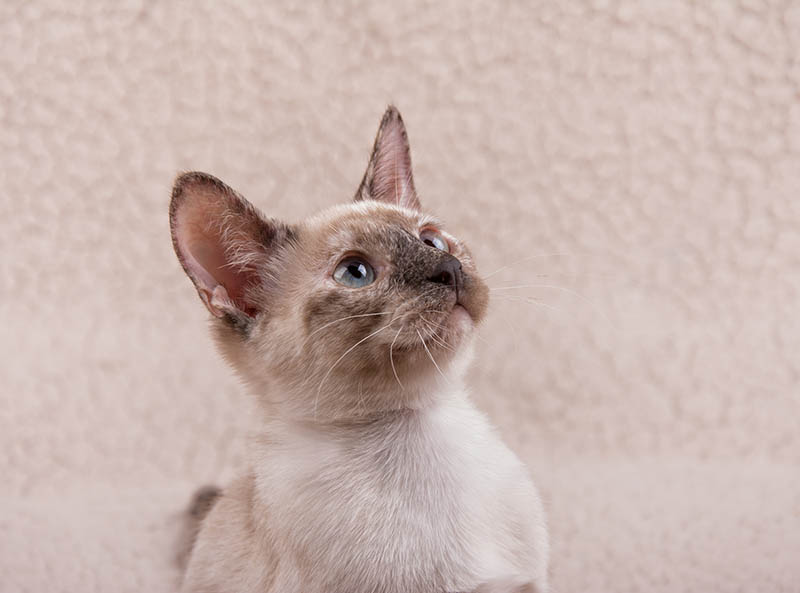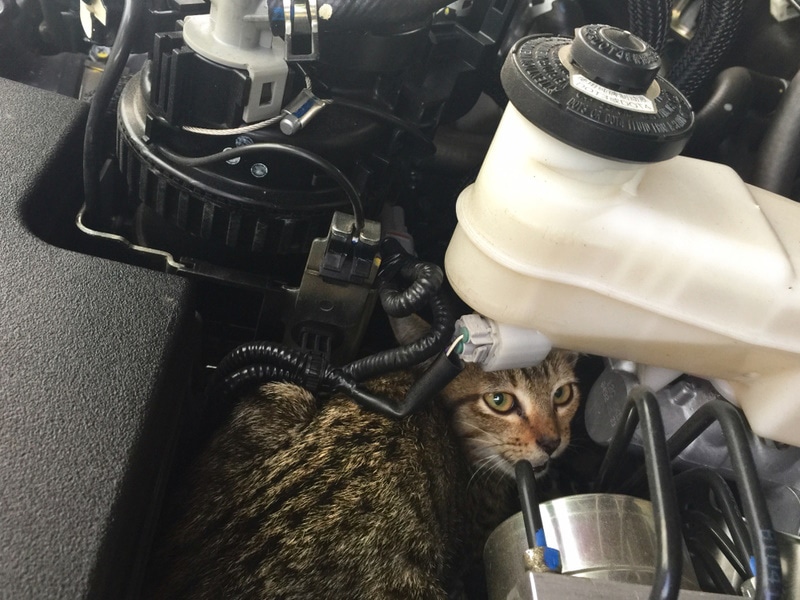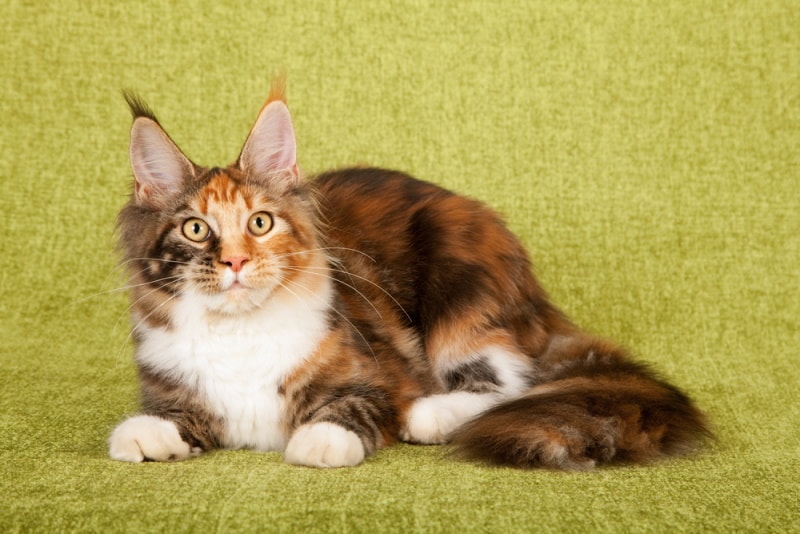My Cat Killed a Bird: 5 Vet Approved Tips on What to Do Next
Updated on
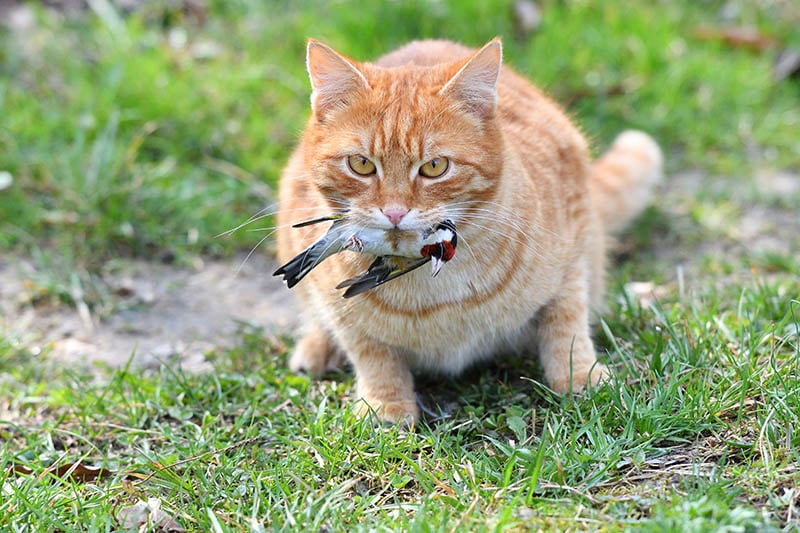
Click to Skip Ahead
When your cat has access to the outdoors, chances are they will bring home innocent critters every once in a while. If your feline family member decided to show off their incredible hunting skills by killing an unsuspecting bird, you may be wondering what you should do next.
This type of situation is never pleasant to deal with, and you most definitely want to keep it from happening again. You’ll need to take action not just by disposing of the bird properly, but by implementing some preventative measures to keep your local wildlife safe from your cat’s natural instinct to hunt. Here’s what to do next if your cat kills a bird.
The 5 Tips on What to Do If Your Cat Has Killed a Bird
1. Remove Your Cat from the Situation
If your cat just killed a bird, don’t panic. While you don’t want this behavior to continue, this is normal behavior for these stealthy little carnivores. Never get upset with your cat or try to punish them in any way. After all, they are just doing what comes naturally to them.
You do need to remove them from the situation so that you can prevent them from eating the bird and confirm that the bird has died. Use your typical happy tone to call them over to you and either place them inside or anywhere away from the scene of the crime so that you can do all the cleanup.
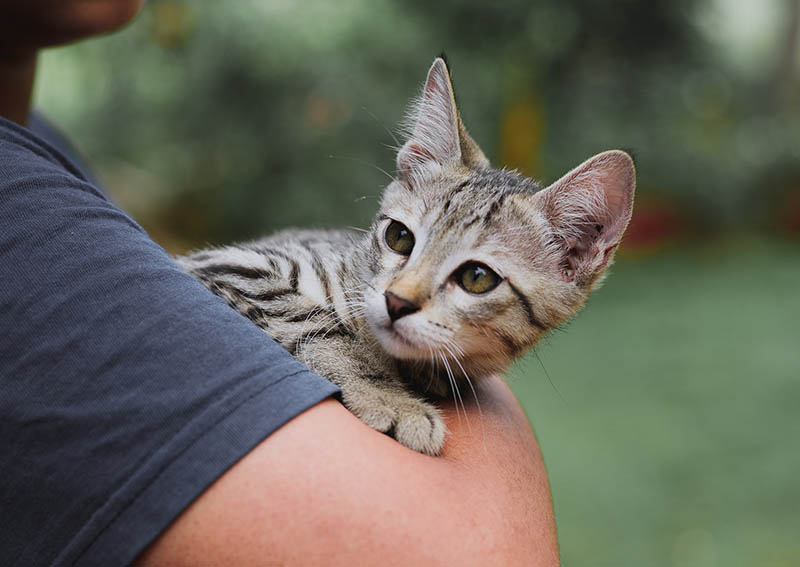
2. Confirm the Bird Has Died, Then Dispose of the Body
Once your cat is out of the way, you should confirm whether the bird has died, or whether it has just been stunned or severely injured. If the bird is still alive, you should reach out to a local wildlife rescue for assistance.
Do a quick online search to find someone in your area that can help you. If you have any trouble and are in the US, the Humane Society of the United State has a resource tool on their website to help you locate someone in your state 1. Once you get in contact, they will be able to guide you on the next steps and how to get the bird the care it needs. If you are not in the US, contact the relevant wildlife authorities in your area.
If it’s too late for the bird, you will need to dispose of the body to prevent your cat, any other pets, or children from coming in contact with the body. You also don’t want the bird laying out to decay in plain sight. Birds can carry transmissible diseases, so you need to get the body taken care of as soon as possible.
Never handle a wild bird with your bare hands. You should use gloves or disposable material to pick them up by hand, or you can just grab a shovel. You can do one of two things with the body: bury it or dispose of it in the outdoor dumpster. It is best to follow wildlife regulatory guidelines to decide which option is most appropriate.
Disposing of the Bird Properly
If you choose to place the bird in the dumpster, you first need to double-bag it in two sealed or tied plastic bags. Not only will this prevent scavengers from sifting through your dumpster, but it will also keep the dumpster from smelling like death and decay until it’s time for the garbage man to come.
If you would rather bury the bird, you can do that too. Take it to a place in your yard that has minimal foot traffic. Dig an appropriately sized hole at least two feet deep, place the bird in the hole, and then refill it, making the grave even with the ground. This depth will prevent the bird from being dug up by pets or other scavengers or being uncovered by harsh weather conditions.
We recommend not placing the bird in any type of container because these items do not break down organically. If the body is placed directly in the ground it can go through a natural decaying process in the ground.
3. Clean the Scene of the Crime
When a cat kills a bird it can get quite messy. The area where the killing took place may be covered in feathers, blood, or innards. If your cat did the killing outdoors in the yard, you may not have to do much cleanup unless you want to pick up the feathers. You can do so by wearing good quality rubber gloves.
If there has been a bloody mess left on your porch, sidewalk, or walkway, you will want to clean this up and restore it to its usual look. Whether it is on your wooden deck or pavement, put some hydrogen peroxide on the blood stains and allow it to sit for 15 minutes.
Use cold water and a patio scrub brush to scrub away the stains. You can even use a mixture of one part bleach to ten parts water to help scrub the area. Rinse it down one final time with a hose and you should be good to go. Ensure no animals can access the cleaned area where the detergent is used until it completely dissolves and dries.
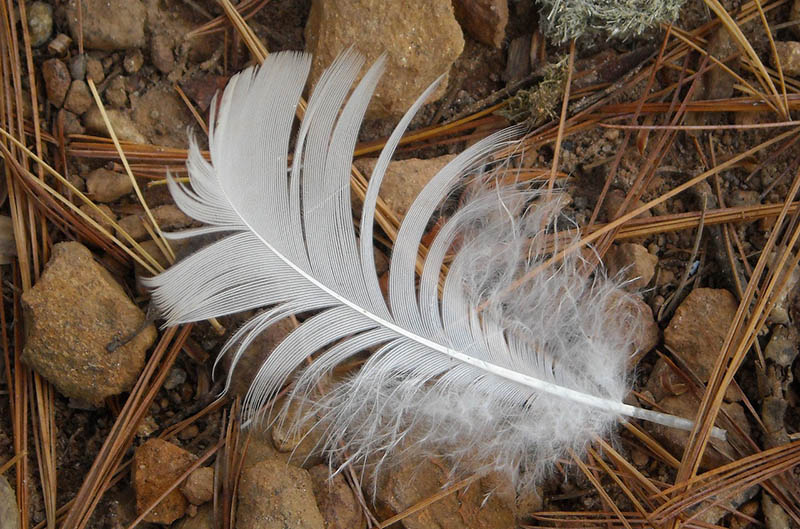
4. Monitor Your Cat for any Signs of Illness
More likely than not, your cat is going to be just fine. As a precaution though, we recommend monitoring them for any signs of illness. Killing a bird can expose your cat to a variety of bacteria, the main concern being Salmonella bacteria.
Salmonella is a bacteria that is most often transmitted through contaminated food or water, but animals and humans can also pass it along. Birds are potential carriers of Salmonella and your cat could potentially be infected after coming into contact with the bird or ingesting any part of their prey.
When a cat is infected with Salmonella after eating a bird, it is sometimes referred to as Songbird Fever. If your cat starts exhibiting any unusual signs, it’s best to call your veterinarian for further guidance.
Signs of Salmonella (Songbird Fever) in Cats
- Lethargy
- Diarrhea (may contain blood in it)
- Vomiting
- Lack of appetite
- Fever
Don’t forget to protect yourself and your family from Salmonella, as this is a zoonotic bacteria that can pass from animals to humans. Take precautions when handling your cat, avoid coming into contact with their waste when you are cleaning the litter box, and wash your hands frequently.
5. Enforce Preventative Measures
Cat owners need to be aware of how critical wild birds are to the natural function of the ecosystems they inhabit. Birds are pollinators, seed distributors, and help control insects, among many other important things in your environment. Domestic cats must be prevented from killing these precious animals.
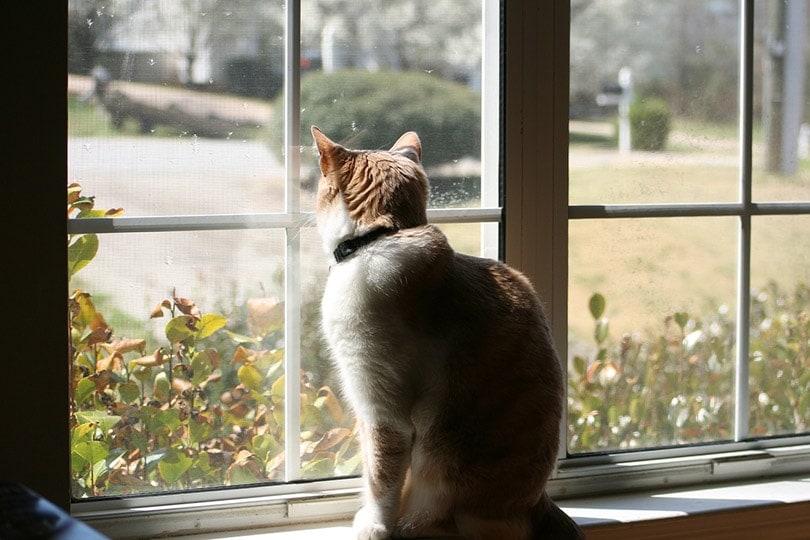
The Impact of Cats on Ecosystems
Most people don’t realize the significant impact outdoor domestic cats are having on ecosystems all over the world. The wide-scale killing of wildlife by our beloved pet cats is the same as any invasive species wreaking havoc on a new ecosystem.
Researchers have calculated that cats kill approximately 2.4 billion birds and 12.3 billion small mammals in the United States each year, and that’s not including reptiles. For birds, this far exceeds any human-related deaths such as pesticides or car collisions. Worldwide, cats have contributed to the extinction of at least 33 species.
How to Prevent Your Cat from Killing Wildlife
Cats are just following their instincts when killing wildlife, so it is up to us as responsible owners to keep this from happening. Humans domesticated and then introduced them into the habitats they are destroying. If we all work together and do our part, we can prevent further destruction.
Keep Your Cat Indoors
The only surefire way to keep birds and other wild critters safe from your cat is by keeping them indoors. It may be hard to get a cat that is used to roaming outside to be happy in the house, but it is necessary to prevent this problem. If you have an outdoor cat, try to limit outdoor time as much as possible.
Place Any Bird Feeders or Bird Baths Strategically
If you love to watch birds and either have bird feeders or birdbaths, you should consider making it harder for your cat to hunt them down while birds are vulnerable in these areas. Do not allow your cat to have access to these areas.
Use a Breakaway Bell Collar
If you have a bell on the cat’s collar, this will warn birds and other potential prey of your cat’s presence and ruin their stealth. Bell collars give off that jingle anytime the cat moves, which is not such a good thing if you’re a cat on the prowl, but a great thing if you’re an unsuspecting bird. Please note though that this isn’t guaranteed to work, as sometimes, cats can approach with enough stealth to where the sound of the bell won’t make a difference when they suddenly lunge for their prey.
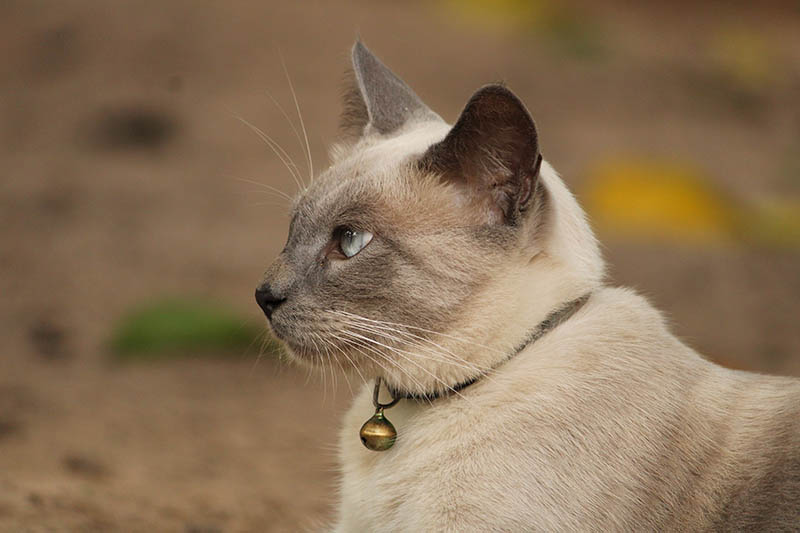
Remember to make sure the collar is a breakaway collar. Outdoor cats can easily get tangled up and collars that do not give under tension could potentially harm or kill your cat if they were to get snagged on something.
We all know how curious cats can be! Keep your cat safe with our Hepper Breakaway Collar, made of 100% natural hemp. This collar's quick-release mechanism will make sure your cat never gets stuck, and the metal slip-locks will ensure a tight fit for any breed. Plus, the included jingle bell will protect your local wildlife.
Enforce Preventative Measures
In-ground fencing is typically associated with keeping dogs in the yard, but these fences have also proven effective for cats. This will limit your cat’s radius and prevent them from covering more ground.
Tall privacy fences that are 6 feet tall or more can sometimes be effective in keeping your cat in the yard. Keep in mind, cats are great climbers and will go to great lengths to explore the world around them, so this isn’t a fool-proof method. You’d have to frequently examine the fence for any holes or loose panels because cats can sneak through small spaces.
Have Your Cat Spayed or Neutered
You may be wondering what having your cat altered has to do with catching birds. Well, it’s not going to be the most effective method but it will prevent your cat’s desire to roam far distances from your home and possibly kill and bring back birds in the process. Plus, it also prevents unwanted litters from continuously overwhelming animal shelters and rescues and contributing to pet overpopulation.
Construct a Catio
If you haven’t seen a catio yet, you should check them out. This could end up being an expensive project, especially if you don’t have a space set up that you could dedicate to it. But essentially, catios allow your cat to have some outdoor space without being fully outdoors.
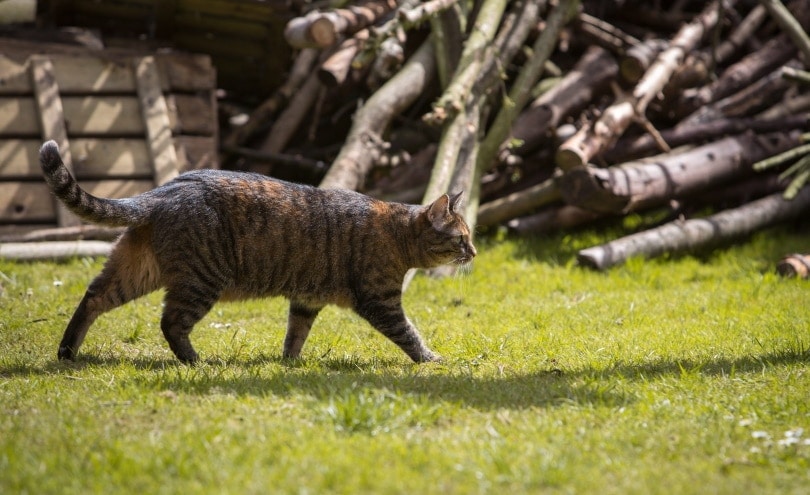
Supervised Leash Walks
If your cat loves to explore the outdoors, and is leash-trained, you can still let them roam outdoors by using a leash. This ensures that they are able to roam, but also protects wildlife from your cat. In addition, it protects your cat from wildlife, motor vehicle accidents, and other mishaps.
Conclusion
If your cat kills a bird, you will need to dispose of the bird’s body properly and monitor your cat for any signs of illness. Birds can sometimes carry harmful bacteria, which could easily infect your cat if they were to come in contact with them. Make sure to use all safety precautions as you dispose of the bird for your own safety, then consider implementing some preventative measures to keep your cat from killing any more birds.
Whenever in doubt about handling wildlife, it is best to seek advice from local authorities. Likewise, if you’re in doubt about your cat’s health after an outdoor excursion, it is best to seek guidance and feedback from your veterinarian.
Featured Image Credit: Klimek Pavol, Shutterstock





